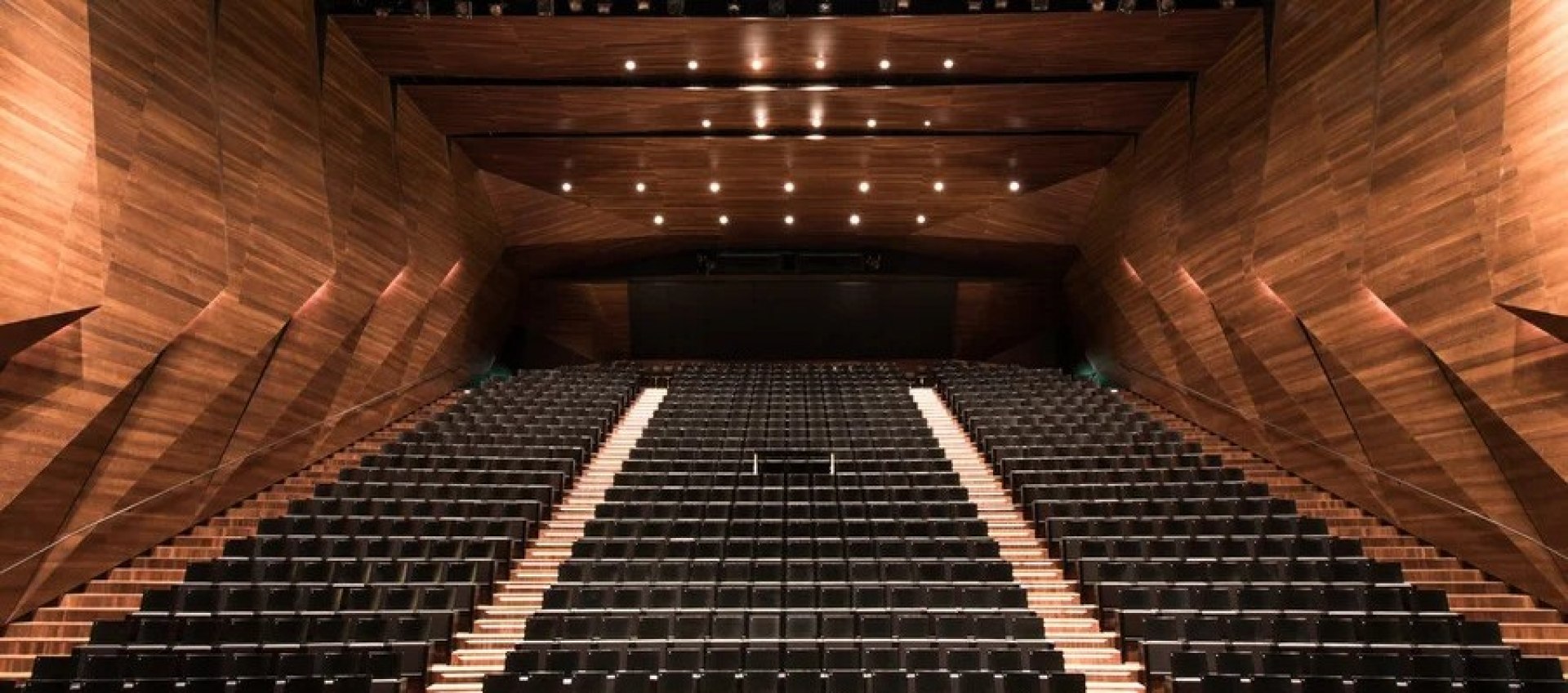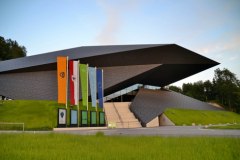The Sleepwalker
December 2025 | ||||||
|---|---|---|---|---|---|---|
Mo | Tu | We | Th | Fr | Sa | Su |
Vincenzo Bellini: The Sleepwalker (concert version)
Four years before Gaetano Donizetti's Lucia di Lammermoor, Vincenzo Bellini's La sonnambula graced the stage. The successful formula is the same: great love, jealousy, and beautiful music. However, this is a semi-serious story. Even though the situation seems hopeless in the end (the title character is caught in her nocturnal escapades), madness and death are not part of the conclusion. In truth, everything is quite harmless, and the lovers are united on Earth, not just in Heaven.
Synopsis
Place: Switzerland
Time: Indeterminate
Act 1
Scene 1: A village, a mill in the background
As the betrothal procession of Amina and Elvino approaches, the villagers all proclaiming joy for Amina, Lisa, the proprietress of the inn, comes outside expressing her misery: Tutto è gioia, tutto è festa...Sol per me non non v'ha contento / "All is joy and merriment... I alone am miserable". She is consumed with jealousy for she had once been betrothed to Elvino and had been abandoned by him in favour of Amina. The lovelorn Alessio arrives, but she rejects his advances. All assembled proclaim the beauty of Amina: In Elvezia non v'ha rosa / fresca e cara al par d'Amina / "In Switzerland there is no flower sweeter, dearer than Amina". Then Amina comes out of the mill with her adoptive mother, Teresa, the mill owner. Amina thanks her, also expressing her thanks to her assembled friends for their kind wishes. (Aria: Come per me sereno / oggi rinacque il di! / "How brightly this day dawned for me".) Additionally, she thanks Alessio, who tells her that he has composed the wedding song and organised the celebrations; she wishes him well in his courtship of Lisa, but Lisa cynically rejects the idea of love. Elvino arrives, exclaiming Perdona, o mia diletta / "Forgive me my beloved", and explaining that he had to stop on his way at his mother's grave to ask her blessing on Amina. As they exchange vows, the notary asks what she brings to the partnership: "Only my heart" she answers at which Elvino's exclaims: "Ah the heart is everything!". (Elvino's aria, then Amina, then all express their love and their joy: Prendi: l'anel ti dono / che un dì recava all'ara / "Here, receive this ring that the beloved spirit who smiled upon our love wore at the altar".)
The sound of horses' hooves and a cracking whip is heard. A stranger arrives, asking the way to the castle. Lisa points out that it is getting late and he will not reach it before dark and she offers him lodging at her inn. When he says that he knows the inn, all are surprised. (Rodolfo's aria: Vi ravviso, o luoghi ameni, / in cui lieti, in cui sereni / "O lovely scenes, again I see you, / where in serenity I spent the calm and happy days of my earliest youth".) The newcomer, who surprises the villagers by his familiarity with the locality, asks about the celebrations and admires Amina, who reminds him of a girl he had loved long ago. (Tu non sai con quei begli occhi / come dolce il cor mi tocchi / "You can't know how those dear eyes gently touch my heart, what adorable beauty".) He admits to having once stayed in the castle, whose lord has been dead for four years. When Teresa explains that his son had vanished some years previously, the stranger assures them that he is alive and will return. As darkness approaches the villagers warn him that it is time to be indoors to avoid the village phantom: A fosco cielo, a notte bruna,/ al fioco raggio d'incerta luna / "When the sky is dark at night, and the moon's rays are weak, at the gloomy thunder's sound [...] a shade appears." Not being superstitious, he assures them that they will soon be free of the apparition. Elvino is jealous of the stranger's admiration of Amina; he is jealous even of the breezes that caress her, but he promises her he will reform. (Duet finale, Elvino and Amina: Son geloso del zefiro errante / che ti scherza col crin e col velo / "I envy the wandering breeze that plays with your hair, your veil").
Scene 2: A room in the inn
Lisa enters Rodolfo's room to see if all is well. She reveals that his identity is known to all as Rodolfo, the long-lost son of the count. She advises him that the village is preparing a formal welcome; meanwhile she wishes to be the first to pay her respects. She is flattered when he begins a flirtation with her, but runs out at the sound of people approaching, dropping her handkerchief which the Count picks up. He sees the approaching phantom whom he recognises as Amina. She enters the room, walking in her sleep, all the while calling for Elvino and asking where he is. Realising that her nocturnal wanderings have given rise to the story of the village phantom, Rodolfo is about to take advantage of her helpless state. But then he is struck by her obvious innocence and refrains: (Scene: first Rodolfo: O ciel! che tento / "God! What am I doing?"; then, separately, Amina: Oh! come lieto è il popolo / "How happy all the people are, accompanying us to the church"; then together.) Amina continues her sleepwalk and falls asleep on the sofa, but Rodolfo hears the sound of people approaching and, with no other way out, he climbs out of the window.
Amina continues to sleep on the sofa as the villagers arrive at the inn. Lisa enters and points to Amina, who wakes up at the noise. Elvino, believing her faithless, rejects Amina in fury. Only Teresa, her adoptive mother, believes in her innocence: Ensemble finale, first Amina D'un pensiero e d'un accento / "In my thought or in my words never, never have I sinned"; then Elvino: Voglia il cielo che il duol ch'io sento / "Heaven keep you from feeling ever the pain that I feel now!"; then the people and Teresa, the former proclaiming her treachery, Teresa pleading for her to be allowed to explain. Elvino then exclaims that there will be no wedding, and each expresses his or her emotional reaction to this discovery.
Act 2
Scene 1: A wood
On their way to ask the count to attest to Amina's innocence, the villagers rest in the woods and consider how they will express their support to him: (Chorus: Qui la selva è più folta ed ombrosa / "Here the wood is thick and dark"). Amina and Teresa arrive and are on a similar mission, but Amina is despondent, although Teresa encourages her daughter to continue. They then see Elvino coming in the wood looking downcast and sad. He continues to reject Amina, even when the townspeople come in with the news that the count says that she is innocent. Elvino is not convinced and takes back the ring, though he is unable to tear her image from his heart: (Aria, then chorus: Ah! Perché non posso odiarti, infedel, com'io vorrei! / "Why cannot I despise you, faithless, as I should?")
Scene 2: The village, as in act 1
Lisa, Alessio, Elvino and the villagers are in the square. Elvino declares that he will renew his vows and proceed to marry Lisa. She is delighted. As they are about to go to the church, Rodolfo enters and tries to explain that Amina is innocent because she did not come to his room awake – she is a somnambulist, a sleepwalker: (Duet, first Elvino Signor Conte, agli occhi miei / negar fede non poss'io / "I cannot deny, my lord, what my eyes have seen"; then Rodolfo V'han certuni che dormendo / "Certain people when they sleep go about as if awake".) Elvino refuses to believe him and calls upon Lisa to leave, but at that moment Teresa begs the villagers to be quiet, because Amina has at last fallen into an exhausted sleep.
Learning of the impending marriage, Teresa confronts Lisa, who says that she has never been found alone in a man's room. Teresa produces the handkerchief Lisa had accidentally dropped in the Count's room. The Count is unwilling to say what he thinks of this, but continues to insist on Amina's virtue. Elvino demands proof and Rodolfo, seeing the sleeping Amina walking across the high, dangerously unstable mill bridge, warns that to wake her would be fatal. All watch as she relives her betrothal and her grief at Elvino's rejection, taking the withered flowers in her hand. (Aria: Amina Ah! non credea mirarti / sì presto estinto, o fiore / "I had not thought I would see you, dear flowers, perished so soon".) Then as she reaches the other side safely, the distraught Elvino calls to her and she is taken into his arms. Rodolfo hands him the ring which he places on her finger, at which time she awakens and is amazed by what has happened. All rejoice. In an aria finale, Amina expresses her joy: Ah! non giunge uman pensiero / al contento ond'io son piena / "Human thought cannot conceive of the happiness that fills me".
Program and cast
Musical Direction: Francesco Lanzillotta
Amina: Jessica Pratt
Elvino: Francesco Demuro
Lisa: Sarah Dufresne
Rodolfo: Adolfo Corrado
Alessio: Pawel Horodyski
Teresa: Valentina Pernozzoli
Orchestra and Choir of the Tyrol Festival in Erl
Festspielhaus Erl
Festspielhaus
Designed by Delugan Meissl Associated Architects, Vienna, the extraordinary structure boasts 862 seats (130 of which are flexible seats near the orchestra) and the world’s largest orchestra pit (160-sq meters). The total useable surface is 7,000-square meter. General contractor was STRABAG, project manager Ing. Georg Höger.
The new Festspielhaus respects and compliments the architecture of the old Passionsspielhaus and its natural surroundings in a unique way: in the summer, when the Tyrolean Festival Erl or the Passion Plays take place at the white Passionsspielhaus, the dark Festspielhaus will blend with the dark forest, allowing the Passionsspielhaus to be dominant. In the winter it is the other way round: while the white Passionsspielhaus will fade into the surroundings, the dark Festspielhaus will stand out against the white landscape.
The Festspielhaus offers the modern infrastructure that has been sorely missing at the Passionsspielhaus, including a foyer with cloakroom, modern stage machinery, several rehearsal rooms and plenty of space for administrative offices. The Festspielhaus provides the Tyrolean Festival Erl with the basic conditions it needs to ensure the Festival’s success will continue into the future.
Passionsspielhaus
The Passionsspielhaus in Erl, built between 1957 and 159 on plans by architect Robert Schuller, is an architectural and acoustic masterpiece. The structure blends with its surroundings and is a visual extension of the adjoining mountains.
Thanks to its striking shape the Passionspielhaus instantly became Erl’s greatest landmark. Austria’s largest orchestra theater accommodates up to 1500 visitors. The 25-meter wide stage is tiered and provides a spectacular backdrop for the 500 passion play actors as well as the orchestra of the Tyrolean Festival Erl, which performs onstage as there is no orchestra pit.
A café serving snacks and beverages was added in 1997 and an Art Room for 150 visitors was opened in 2003.
When the Festspielhaus was renovated between October 2006 and April 2007 all sanitary facilities were upgraded; an “orchestra pit” with scissor lift and a substructure for the main stage were added; the auditorium got equipped with a deaf loop system and a new floor; the catwalk, the exterior design, the cellar beneath the donkey ramp, the refreshment stand, all electrical installations and the ventilation system were replaced; and the wardrobe and the stairway renovated.
YOUR WAY TO ERL
BY CAR
Germany, Eastern Austria
A8 Munich-Salzburg, Autobahndreieck Inntal, A 93, Motorway exit Nussdorf/Brannenburg or Oberaudorf/Niederndorf
Italy, Switzerland, Western Austria
Inntalautobahn A 12, motorway exit Kufstein Nord or Oberaudorf/Niederndorf; from Italy: after Brenner Pass take A 13 and A 12 (approx. 1 h 20 min to Erl); from the Swiss border it’s a 3 hour drive to Erl; the entire journey is on motorways and expressways.
In Austria, the use of motorways and expressways is subject to payment of a toll.
Munich – Erl approx. 1 hour by car
Salzburg – Erl approx. 1 hour by car
Innsbruck – Erl approx. 45 hour by car
BY TRAIN
All long distance and regional trains stop in Kufstein.
FLIGHTS
Airports
Innsbruck (90 km),
Salzburg (90 km),
München (110 km).

 EN
EN DE
DE IT
IT FR
FR ES
ES RU
RU JP
JP RO
RO
 Seating plan
Seating plan 